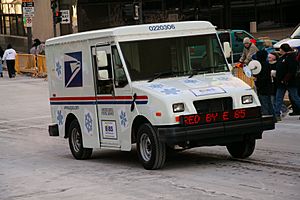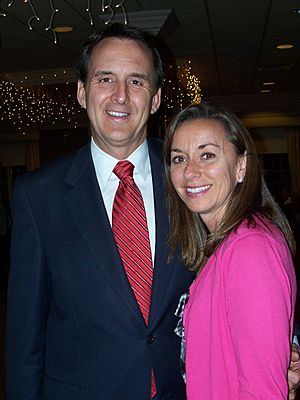Tim Pawlenty facts for kids
Quick facts for kids
Tim Pawlenty
|
|
|---|---|
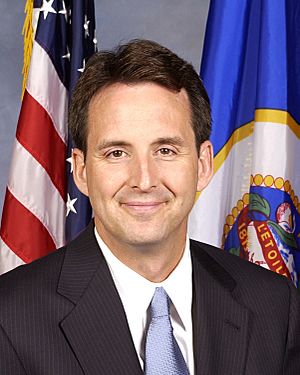
Official portrait, 2003
|
|
| 39th Governor of Minnesota | |
| In office January 6, 2003 – January 3, 2011 |
|
| Lieutenant | Carol Molnau |
| Preceded by | Jesse Ventura |
| Succeeded by | Mark Dayton |
| Chair of the National Governors Association | |
| In office July 23, 2007 – July 14, 2008 |
|
| Preceded by | Janet Napolitano |
| Succeeded by | Ed Rendell |
| Majority Leader of the Minnesota House of Representatives | |
| In office January 3, 1999 – January 3, 2003 |
|
| Preceded by | Ted Winter |
| Succeeded by | Erik Paulsen |
| Member of the Minnesota House of Representatives from the 38B district |
|
| In office January 3, 1993 – January 3, 2003 |
|
| Preceded by | Art Seaberg |
| Succeeded by | Lynn Wardlow |
| Personal details | |
| Born |
Timothy James Pawlenty
November 27, 1960 Saint Paul, Minnesota, U.S. |
| Political party | Republican |
| Spouse |
Mary Anderson
(m. 1987) |
| Children | 2 |
| Education | University of Minnesota, Twin Cities (BA, JD) |
| Signature | |
Timothy James Pawlenty (born November 27, 1960) is an American lawyer, businessman, and politician. He served as the 39th governor of Minnesota from 2003 to 2011. A member of the Republican Party, Pawlenty was also a leader in the Minnesota House of Representatives. He ran for president in 2012 but was not successful.
Pawlenty studied at the University of Minnesota and became a lawyer. He also worked as a vice president for a software company. In 1992, he was elected to the Minnesota House of Representatives. He was reelected four times and became the House Majority Leader in 1998. After getting the Republican Party's support, Pawlenty won the election for governor in 2002. He promised not to raise taxes and worked to reduce the state's budget problems by cutting funds and adding "user fees." He was reelected in 2006.
As governor, Pawlenty made changes to Minnesota's education system. He also supported public projects like the Northstar Commuter Rail Line and Target Field. From 2007 to 2008, Pawlenty was the chairman of the National Governors Association. He was considered for presidential and vice-presidential roles in 2008 and 2012. He ran for governor again in 2018 but lost in the primary election.
Contents
Early Life and Education
Pawlenty was born in Saint Paul, Minnesota. His father delivered milk, and his mother passed away when he was 16. He grew up in South St. Paul and played ice hockey in high school.
He was the first in his family to go to college, attending the University of Minnesota. He first planned to be a dentist but changed his mind. He worked as an intern for U.S. Senator David Durenberger. In 1983, he earned a degree in political science. He then got a law degree from the University of Minnesota Law School in 1986. There, he met his wife, Mary Anderson, and they married in 1987.
Pawlenty started his career as a lawyer. Later, he became a vice president at a software company called Wizmo Inc. He moved to Eagan, Minnesota, and was elected to the City Council at age 28.
Time in the Minnesota House of Representatives
Pawlenty was elected to the Minnesota House of Representatives in 1992. He worked on bills to set term limits for committee leaders and fund parenting classes. He also supported stronger laws for serious crimes. When the state had extra money, he wanted to lower taxes instead of increasing education funding. He was reelected four times. In 1998, he became the House Majority Leader when Republicans gained control.
Serving as Governor
2002 Election for Governor
In 2002, Pawlenty wanted to run for governor. He first considered running for the U.S. Senate but changed his plans. He then won a close race in the Republican primary election for governor.
In the main election, Pawlenty faced two strong opponents. He promised not to raise taxes to fix the state's budget problems. He also supported requiring a 24-hour wait period for certain healthcare decisions. He won the election with 43.8% of the votes. Many voters in the suburbs of Minneapolis–St. Paul supported him.
2006 Reelection
Pawlenty ran for reelection in 2006. Some people criticized him for supporting funding for new sports stadiums and public transportation projects. He won the election by a very small margin, less than one percent. However, the other major party gained control of both the state House and Senate.
State Budget and Spending
Pawlenty was elected in 2002 promising to balance the state's budget without raising taxes. He often used the slogan "no new taxes." During his time as governor, state spending grew at a very low rate compared to previous years.
In his first year, Minnesota faced a huge budget problem of $4.3 billion. After discussions with the state Senate, he signed a plan that included fee increases, spending cuts, and changes to how the government worked. This plan helped solve the budget problem. He reduced how much funding increased for services like transportation and social programs.
In his second term, Pawlenty fixed another $2.7 billion budget problem by cutting spending and using federal money. His last budget (2010–11) was the first time since 1960 that government spending actually went down over a two-year period.
Some people criticized Pawlenty for only finding short-term solutions to budget problems. They said that when he left office, the state still faced a large budget shortage. They also pointed out that property taxes increased during his time as governor. Pawlenty argued that he was committed to balancing the budget without raising taxes.
Court Case on Spending
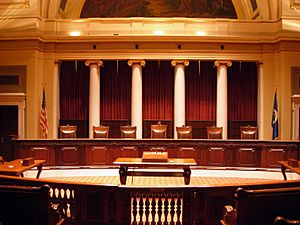
Pawlenty used a power called "unallotment" to make spending cuts without the legislature's approval. In May 2010, the Minnesota Supreme Court ruled that he had gone too far. The court said that because the state legislature and governor had not agreed on a balanced budget, Pawlenty could not make such large cuts on his own.
Pawlenty said he would continue to fight to reduce spending and taxes. After the court's decision, he vetoed a budget plan that would have raised taxes for high-income earners. Eventually, the legislature approved most of his original spending cuts.
Funding Public Projects
Minnesota's rules prevent state-run gambling outside of Native American lands. Pawlenty suggested working with the state's 11 Native American tribes to share profits from their casinos. This idea was not popular with all tribes or some lawmakers.
Pawlenty also worked to fund a new baseball stadium for the Minnesota Twins in Minneapolis. He signed a bill that used a county sales tax to pay for it. He and the legislature agreed that a public vote on the tax was not needed due to long debates.
In June 2006, Pawlenty signed a large public works bill. This bill included money for the Northstar Commuter rail line, a prison expansion, and new buildings at state universities.
Education Changes
Pawlenty tried to protect education funding while cutting other government spending. In 2009, he used federal money to boost education funds. He was a strong supporter of charter schools. In 2010, Minnesota was ranked number one in the country for promoting charter schools.
He also oversaw changes to the state's graduation requirements, renaming them the Minnesota Academic Standards. These new standards aimed to improve what students learned in school.
Transportation Improvements
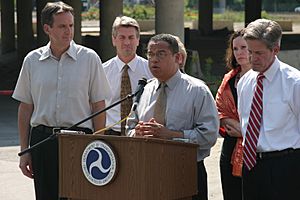
During Pawlenty's first term, traffic in cities was a big concern. He appointed his lieutenant governor, Carol Molnau, as transportation commissioner. She tried to make changes to the transportation department.
Pawlenty preferred using fees and toll lanes to manage traffic. He also used his veto power on bills that would have funded highway repairs and public transit. After the collapse of the I-35W Mississippi River bridge in 2007, he said he would consider allowing a state gas-tax increase for road and bridge repairs.
He had previously opposed the Northstar Commuter Rail but changed his mind in 2004. He announced a plan to fund the project, which was seen as helpful for commuters.
In 2008, Pawlenty used his veto power to remove $70 million for the Central Corridor light-rail project, which would connect Minneapolis and Saint Paul. He said he did this to encourage the legislature to be more careful with spending. However, he supported the project overall. The funding issue was later resolved.
Public Safety Policies
Public safety was an important issue during Pawlenty's time as governor. When crime rates increased in Minneapolis, city officials blamed Pawlenty for cuts to state aid. He, in turn, criticized the city for how it used its money.
Pawlenty worked to increase penalties for serious crimes. In 2005, the state legislature passed new sentencing rules, including the possibility of life sentences for very serious offenders. He pushed for even tougher sentences in 2010.
In 2006, Pawlenty announced a program to change how the state dealt with people who were in the United States without permission. He said that the economic benefits did not justify the behavior. His plan included creating a team of state law enforcement officials to focus on crimes like identity theft. He also proposed tougher penalties for false identification and fines for employers who hired people without proper authorization.
Energy and Environment
Minnesota has required a 10% mixture of gasoline and ethanol (gasohol) since 1997. Pawlenty also encouraged other governors to require more ethanol use across the country.
In 2007, Governor Pawlenty signed the Next Generation Energy Act. This law aimed to reduce greenhouse gases and create a system to control pollution. However, by 2009, Pawlenty changed his view, calling the system "overly bureaucratic." By 2011, he suggested that most, if not all, climate change was due to natural causes.
Healthcare Initiatives
In 2005, Pawlenty asked a U.S. Senate group to allow his MinnesotaCare health plan to expand. This would let state residents and employees buy cheaper prescription drugs from Canada.
In 2007, Pawlenty signed a bill that funded a group of healthcare experts. This group was tasked with finding ways to lower healthcare costs, improve quality, and develop a universal healthcare plan for Minnesota.
Later, he used healthcare funding cuts to balance the state budget. In 2009, he suggested cutting payments to doctors and using healthcare funds for the state's general budget. He also vetoed $381 million from health and human services funding. This could have caused many Minnesotans to lose their health insurance.
In 2010, he turned down some federal healthcare funds. These funds would have helped more Minnesotans get Medicaid coverage and set up an insurance exchange.
International Relations
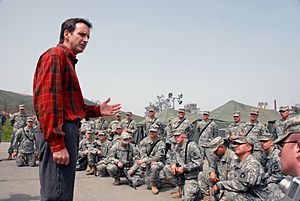
During his time as governor, Pawlenty visited Minnesota troops in places like Iraq, Afghanistan, Bosnia, Kosovo, and Kuwait.
In 2004, Mexican President Vicente Fox visited Pawlenty to discuss strengthening trade. Mexico later opened a consulate in Minnesota. In 2006, Pawlenty sent Minnesota National Guardsmen to the U.S.–Mexico border to help with border security.
In 2005, Pawlenty led a group of nearly 200 Minnesota business and government leaders on a trip to China. The goal was to help Minnesota companies learn about the Chinese market and encourage Chinese investment in Minnesota. He also led trade groups to Canada, Poland, the Czech Republic, India, and Israel.
Other Activities as Governor
Pawlenty hosted a weekly radio show, a tradition from the previous governor. He was also the chairman of the National Governors Association from 2007 to 2008.
Starting in 2005, there were rumors that Pawlenty might run for president. When he announced his run for a second term as governor in 2006, he said he would serve his full four-year term if he won.
In 2007, Pawlenty became a national co-chairman for John McCain's 2008 presidential campaign. He was also considered a top candidate for vice president with McCain in the 2008 election. However, McCain chose Sarah Palin instead.
2012 Presidential Campaign
In February 2005, news outlets identified Pawlenty as a possible presidential candidate. He decided not to run for a third term as governor in 2010. In late 2009, Pawlenty began visiting Iowa, giving political speeches.
Book Tour and Political Views
Pawlenty went on a tour for his book Courage to Stand. He described himself as a social conservative. He believed that government programs like Social Security and Medicare needed to be cut to balance the federal budget. He also thought that states should decide laws about healthcare decisions.
In a December 2010 article, Pawlenty supported private sector labor unions but argued against public sector labor unions. He believed that public employees with unions often had better pay and benefits than private workers, which could lead to higher taxes.
Running for President
On March 21, 2011, Pawlenty announced on Facebook that he was forming a committee to explore a run for president. On April 12, 2011, he stated on CNN that he was "running for president."
On May 23, 2011, Pawlenty officially launched his campaign for president in Iowa. He said he would "just tell the truth." He finished third in the Ames Straw Poll on August 13, 2011. The next day, he announced he was withdrawing from the presidential race. On September 12, 2011, Pawlenty endorsed Mitt Romney and became a national co-chair for Romney's campaign.
Financial Services Roundtable
On September 20, 2012, Pawlenty announced he would leave his role with Mitt Romney's campaign. He became the head of the Financial Services Roundtable (FSR), a group that represents the financial services industry in Washington, D.C. He took on the roles of President and CEO.
In November 2012, Pawlenty said that Republicans and Democrats would need to work together on spending and taxes. He presented himself as an outsider who could bring a new voice to these discussions.
2018 Gubernatorial Campaign
In February 2018, Pawlenty considered running for a third term as governor of Minnesota. He announced his candidacy on April 5. However, he lost the Republican primary election to Jeff Johnson. His campaign was affected by past comments he made about Donald Trump. After his defeat, Pawlenty said that the "Republican party has shifted" and that he was not a "Trump-like politician." He then said he was ending his career in politics.
Personal Life
Pawlenty and his wife, Mary, have two daughters, Anna and Mara. Mary was appointed a judge in Dakota County in 1994. After Pawlenty became governor, the family stayed in their Eagan home instead of moving to the Governor's residence. This was because Mary was required to live in her judicial district. In 2007, she left her judge position to work for a company that helps resolve disagreements.
Pawlenty was raised Roman Catholic. He later became an Evangelical Protestant, influenced by his wife, who attends Wooddale Church. He has said he still respects the Catholic Church and sometimes attends Mass there.
Pawlenty is sometimes called "TPaw" or "T-Paw." In 2004, he ran the Twin Cities Marathon, finishing in under four hours. He was the first sitting governor to complete the race.
See also
 In Spanish: Tim Pawlenty para niños
In Spanish: Tim Pawlenty para niños
 | Jackie Robinson |
 | Jack Johnson |
 | Althea Gibson |
 | Arthur Ashe |
 | Muhammad Ali |


